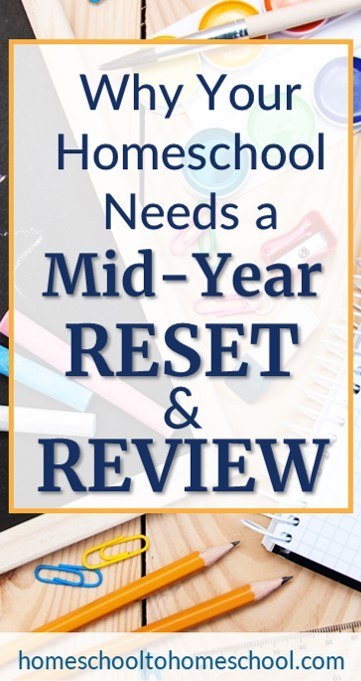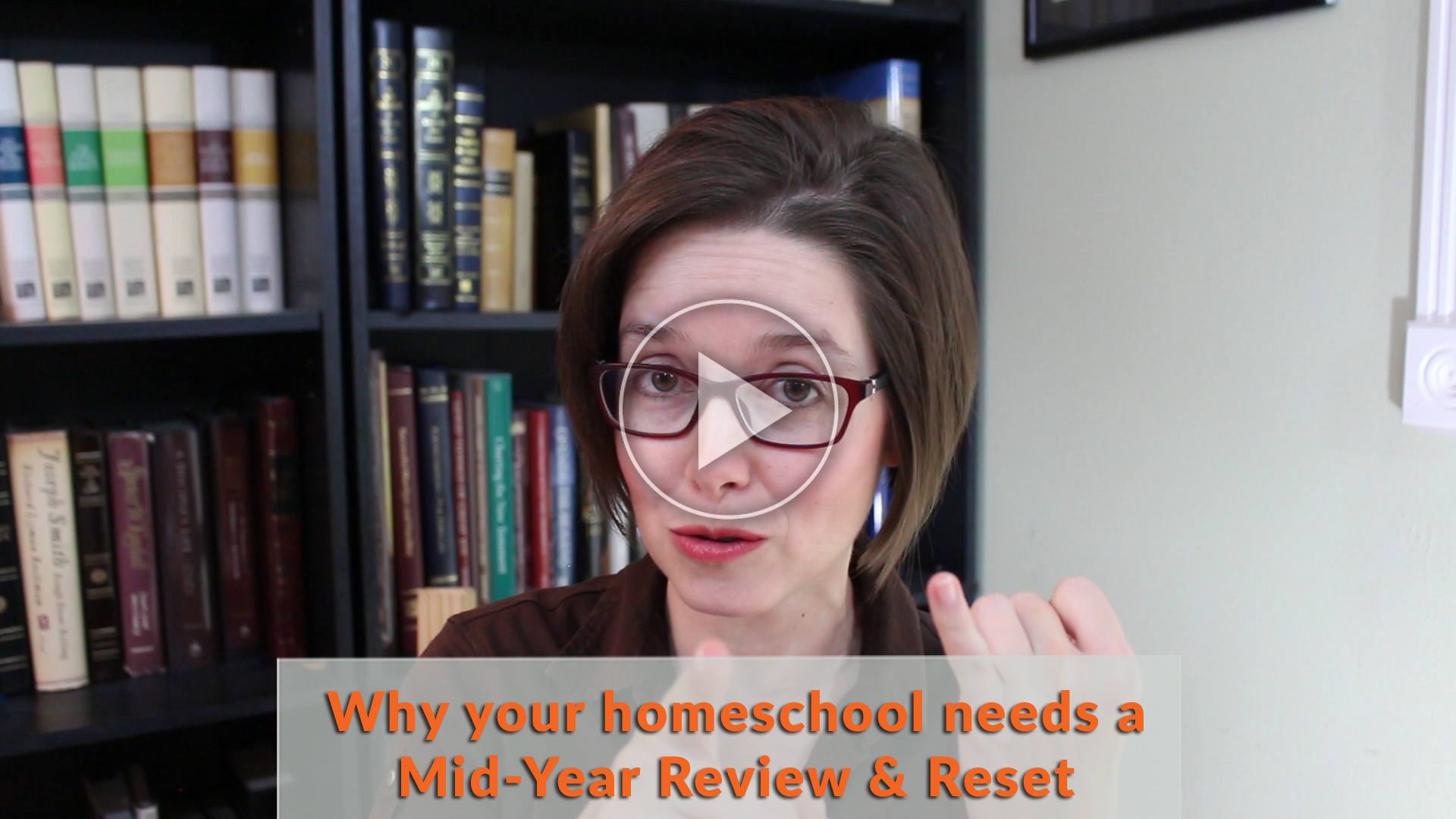It’s January -- which means it’s time for the homeschool Mid-Year Reboot.
What IS the homeschool Mid-Year Reboot, you ask?
It’s when you come back after the holidays and realize you have another four or five months before summer.And you might be feeling a little bit of homeschool burnout. OR you might be super excited to dive back in.
Regardless, it’s the PERFECT time to sit down and do a review (and possibly a reset) of your homeschool.
During your homeschool mid-year review, you may consider radically changing your curriculum or your schedule. Or you may just need to make a few updates to get things working even better.
In today’s video, I’m going to cover WHY you want to do a mid-year review and what kind of changes you might consider making.
[NOTE: In the video, I talk about reviewing your homeschool vision. CLICK HERE to access your FREE lesson on how to create a homeschool vision]
Want to keep reading instead of watch? Scroll to read a transcript of the video.
Ready to feel Confident and Successful as you homeschool?
Register below to watch my FREE CLASS
Confident Homeschool Secrets
7 Ways to Create a Homeschool That Works (and you LOVE!)
Transcript
Things have changed
So here's the deal. No matter how well you planned at the beginning of the year, no matter how much work and effort you put into it, your kids have changed. Your life has changed. Things are different than they were in September or August or whenever you started. And so there's a good chance that you need to change things up because we're always experimenting in homeschooling. We're always figuring out what's gonna work and so it's, you know, it's time to do this.
3, 4 month chunks
I like to actually think of my year, my homeschool year, in three, four month chunks. I know that's not how everybody thinks of the school year, but I like to think of the months before December, like from September until the end of December and then another chunk that happens from January to about April and then our third chunk is the summer, which is may through August. That's kind of how I like to think about it and what's nice about that is a four month chunk is enough that you kind of know if something's working but isn't so long that you don't have time to switch things up and try something new.
Give yourself a break
Now, before you get into doing all of the things I'm going to talk about in this video, please keep in mind we are just ending the holidays. That means that you probably just did Thanksgiving, you did Christmas and those are crazy times for homeschooling. There's breaks, there's travel, there's vacation, and it's really easy to look at those, that little chunk of time and think that you're completely failing your homeschool because you didn't do anything because maybe you were so busy traveling or it's just you lost steam or things weren't working. So remember that you have to look beyond the holidays and look farther back to kind of get a sense of whether things were working before the holiday started. And then you'll know how you want to move forward.
Step One: Vision
Now the very first thing I recommend you do to do your midyear review is go review your homeschool vision. I talk about this all the time. You have to have a vision. You have to know where you're going with your homeschool and what you need to do in order to move forward. And if you don't have that vision it is really hard to know whether or not you're moving forward in the right way. So if you've already created your vision, awesome, go take a look at it. If you haven't, I want to help you out. I actually have a free lesson that you can listen to that will walk you through step by step how to create a homeschool vision. There's a link going to be below this video or up above or wherever you're watching it so that you can go watch, listen to that lesson and walk your walk. It'll walk you through the steps that you need to do to create a homeschool vision because it's really hard to do anything if you don't have that in place.
Step Two: Questions
Now, once you have in fact reviewed your homeschool vision, I now recommend that you ask yourself a few questions as part of this midyear review.
#1 What is working
Now the first question is what is actually working? We want to start with the positive. Look at your curriculum, look at your schedule, look at what you've actually accomplished and recognize and celebrate the successes and whatever's working. You want to capitalize on that and you want to keep going.
#2 What do you look forward to
The second question you want to ask yourself is what parts of your homeschool do you actually look forward to? And this could be anything from you know, snuggling on the couch reading or going on field trips during non-busy times. It might be when you guys get to sit down and play games or it might even be that you guys have gotten super excited about a certain subject and you just want to go deeper into that subject. Homeschooling is all about the adventure, right, so you're going to look at what are you actually enjoying because if you're having fun and your kids are having fun, you are more likely to be leaning into and looking forward to homeschooling every single day. You want to do more of the things that you look forward to and less of the things that you don't.
#3 What isn’t working
Now we're going to go into the next question. The third question I want you to ask is what isn't working and why. Not just "Oh, the math curriculum we picked it is not working", but really dig into why isn't it working? Is it not working because you have the wrong schedule? Is it not working because you're doing it at the wrong time or is it not working because it is just not the right fit for your kid? If it isn't, that's okay. You can either resell it or you can shelve it and maybe come back to it later and move on to something else or change directions. I know that that's what we're doing with a particular math curriculum with one of my kids. We are completely changing and trying something completely new because as I've done my midyear review, I'm realizing what we were trying is not working. Other things are really working so, but the reason I was able to make the switch is because I didn't just say what's not working, but I figured out why so I knew what I was looking for in the new change.
#4 What do you dread
The next question, what are you dreading? What do you dread about homeschool and why? Is it that you dread sitting on, you know, everybody says that you're supposed to sit on the couch and read with your kids, but you dread it. But because you have a two year old that's running around, pulling on the book and wreaking havoc while you're trying to read, okay, it might be time to either address that child's needs or maybe try to do it in a different way, or maybe just do something different altogether. If you look at the why of what you're dreading, you'll come up with you'll be able to have a foundation to then make different decisions and move forward.
Step 3: Adjustments
Now, after you've asked yourself those questions, the third thing you want to do is figure out, okay, what are you going to keep as is? What do you need to adjust, keep and adjust. What do you just want to toss? What are you completely done with? And you'd say, you know what? That didn't work. No guilt, no shame. It happens to the best of us. It happens to all of us. You move forward. You're always tweaking and adjusting.
Now there's a couple of just quick things to keep in mind that I recommend as you're doing this. First of all, we almost always have too much crammed into our homeschool schedule. Simple is better. So as you are doing this review, be sure to be looking to take things out because almost always that is the answer rather than trying to put things in.
The second thing I just want you to keep in mind is that there's a good chance that things are working more than you realize. It is so easy to see all the things that aren't working. It's a lot easier to miss the things that are working and sometimes the changes are imperceptible, very, very slowly incremental. I remember when we were teaching my son to read, it felt like it wasn't working and it wasn't working and it wasn't working. And it took forever to get to the point where he was finally reading and it was because the, and it wasn't because we weren't doing the right things. It was because it just needed time and it needed incremental steps by step and we were only going to get there if we just kept going.
So keep in mind that more is actually happening than you may realize. Now, those are my three major steps. First, review your homeschool vision, and if you haven't got a homeschool vision, go check out that lesson so you can write one second, ask yourself the questions that I went through. And the third is figure out what you're going to keep, what you're going to adjust and what you're going to toss.
Now, if you're looking for a major reset and I'm talking like you know nothing's working and you want to go back to the drawing board and you're just feeling overwhelmed and maybe even like you want to quit, then please, please, please check out my free webinar. It's called confident homeschool secrets, and I go through many of the secrets that longtime homeschoolers know that really, really, really can help you be successful as a homeschool family, as a homeschool mom, as a homeschool dad, it's completely free and there is a link to sign up to watch that as well.
I am excited for you. We are headed into the second half of the year. This is when you really dig in and you get, you can make your homeschool happen and it's time to just adjust a few things so you can finish out the year super successfully. My name's ToriAnn Perkey and from my homeschool to your homeschool, happy homeschooling. I make these videos every week so that you can be a successful and confident homeschool mom.
Save for later by pinning to your favorite Pinterest board!




